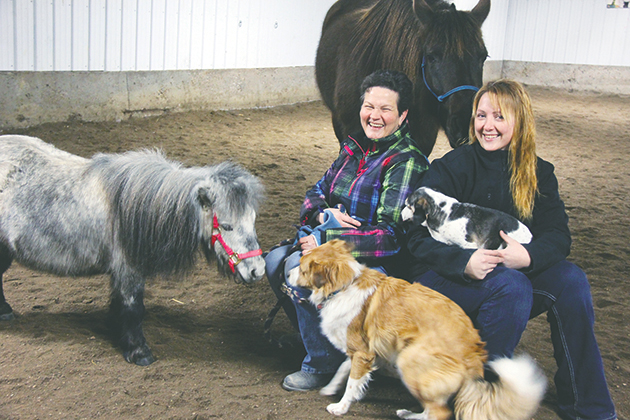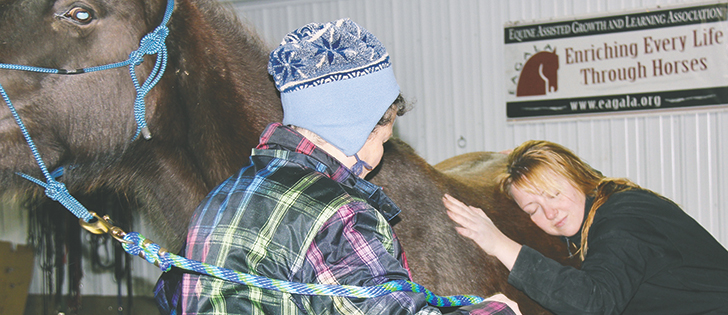Retired dairy farmer turns barns into meeting rooms and arena to provide equine assisted psychotherapy for clients with mental illness
GRENFELL, Sask. — For four decades, Nancy Maurer has been in careers providing needed goods and services to people as a lab and X-ray technician and dairy farmer.
When she retired in 2011, she knew that helping people would have to continue.
After she and her husband, Daryl, and Lavern and Jan Maurer sold the dairy herd and milk quota and rented the land, Maurer saw an opportunity to combine her passion for horses and people through an equine therapy service.
“I’ve always loved to help people, it didn’t matter if it was my kid or someone else’s kid, or my dog, that’s just part of who I am,” said the mother of four adult children.
Read Also

Know what costs are involved in keeping crops in the bin
When you’re looking at full bins and rising calf prices, the human reflex is to hold on and hope for more. That’s not a plan. It’s a bet. Storage has a price tag.
At age 60, Maurer took a leap of faith, travelling to the United States to take an EAGALA equine therapy course and converting the family’s barn and cow shed into a meeting room and indoor arena.
She established a non-profit corporation and began seeking clients to work with her, social workers and 15 horses at Discovery Ranch.

Magnusson and Maurer are surrounded by attention seeking animals, including Little Angel, a miniature horse. They visit nursing homes and birthday parties as part of the services offered by Discovery Ranch. | Christalee Froese photo
The equine assisted psychotherapy and learning ranch offers a variety of services, including sessions for individuals, couples and families and workshops and camps dealing with specific ailments like post-traumatic stress disorder and depression.
Some clients are referred to Maurer by social workers or educators, while others find the ranch through word of mouth.
Maurer said the addition of horses to the therapy mix helps speed up both issue identification and healing.
“It’s the intuition that the horse has that makes them very special for therapy,” said Maurer, who works in tandem with a social worker or psychologist.
“There’s no hiding your feelings from a horse because they already know what’s happening inside. The horses will mirror what is going on with the client.”
The quick identification of issues allows clients to learn to release their anxieties and fears.
“If I have someone who is having trouble opening up, I say, ‘take this horse for a walk and go to a quiet place and thank it for its attention and then tell it something you’ve never told anyone before,’ ” said Maurer, adding that the ability to tell troubles to a non-judgmental being often sets something in her clients free.
Maurer said she has observed complete turnarounds in clients after working with the horses.
“We had a young fellow come to us several years ago and he had cuts all the way up his arms from harming himself and he was into drugs and was hanging out with a bad crowd,” said Maurer, who has worked with the boy for the past two years on a weekly basis.
He is now 16 years old, drug free and has stopped harming himself.
“He’s really quite a wonderful fellow and he simply would not have done well in talk therapy because he has a hard time finding words,” said Maurer.
She points to one particular equine therapy exercise that was life changing for the young man. He had to design a course for the horse to move through, adding four obstacles that were problems in his life. As he led the horse along the path, the final obstacle stopped the horse completely and caused it to protest strongly.
“That horse would back up or pull to the right or the left. It wasn’t going anywhere near that obstacle,” said Maurer.
The social worker subsequently took the boy outside for a talk and found out that the blockage was thoughts of suicide and the boy was finally able to discuss the issue openly, releasing some of the anxiety around it.
Amber Magnusson, an equine massage therapist who has been working with Maurer for more than a year, said the equine therapist has a special ability to communicate with clients.
“Nancy’s energy helps you, too, because she’s so laid back and always smiling and laughing and that makes you feel very welcome and you know she wants the best for you,” said Magnusson.















